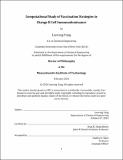Computational Study of Vaccination Strategies to Change B Cell Immunodominance
Author(s)
Yang, Leerang
DownloadThesis PDF (9.601Mb)
Advisor
Chakraborty, Arup K.
Terms of use
Metadata
Show full item recordAbstract
B cell Immunodominance refers to the phenomenon where B cells that target certain epitopes of a pathogen are preferentially selected among the B cells that potentially target diverse epitopes presented on a pathogenic protein. This phenomenon presents a challenge in the development of vaccines against mutable viruses like HIV, influenza, and SARS-CoV-2 which rapidly modify the immunodominant epitopes and render existing antibodies ineffective. Moreover, as the immune system preferentially targets immunodominant epitopes, functionally important and conserved epitopes are less targeted, which poses a barrier to the generation of broadly neutralizing antibodies.
Computational modeling offers a valuable tool for understanding how immunodominance arises from the stochastic and dynamic processes of immune response. By simulating the systemic interactions between B cells, helper T cells, antibodies, and antigens, we can gain insights into the underlying mechanisms of immunodominance, thereby informing more effective vaccine design strategies. In this thesis, computational models are developed to investigate strategies for modulating B cell immunodominance in vaccinations. Experimental data from collaboration are used to validate model findings.
The first project investigates engineered influenza immunogens designed to elicit cross-reactive B cells targeting the receptor-binding site. A computational model reveals that the efficacy of an immunogen in eliciting cross-reactive antibodies depends on interactions between B cell antigen engagement and T cell-mediated selection within germinal centers. The second project addresses the enhanced efficacy of a third dose of SARS-CoV-2 vaccines against the Omicron variant. Through computational models and human vaccination data, we find that a third dose significantly boosts neutralizing antibody responses by targeting less-mutated, subdominant epitopes. This is facilitated by pre-existing antibodies from earlier doses, which improve antigen availability and partially mask immunodominant epitopes. The third project seeks to optimize 'slow delivery' immunization schemes. Our mathematical models, developed in collaboration with experimentalists, propose a practical way to optimize vaccine delivery kinetics for superior T follicular helper cell and antigen-specific germinal center B cell responses.
Date issued
2024-02Department
Massachusetts Institute of Technology. Department of Chemical EngineeringPublisher
Massachusetts Institute of Technology